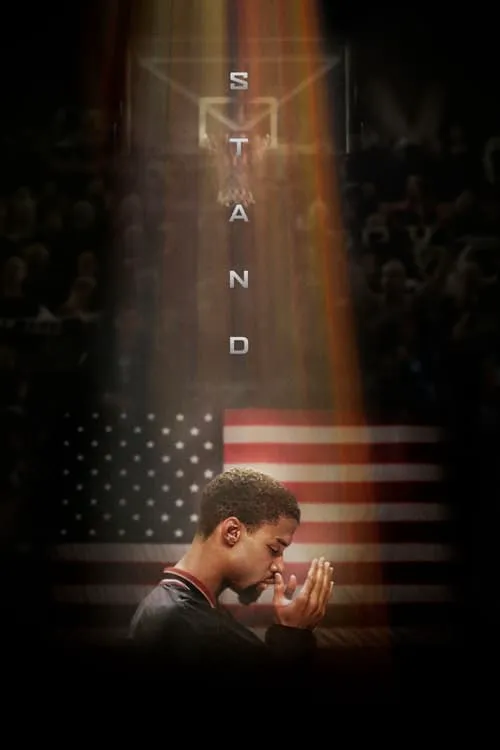Stand

Plot
Chris Jackson was just a regular kid from Louisiana, growing up in the tumultuous world of high school basketball. He had a natural talent for the game that earned him a scholarship to LSU, where he played for two years and eventually turned pro. In the 1993 NBA draft, the Denver Nuggets selected Jackson in the first round, where he would become a crucial part of the team. However, Jackson's life took an unexpected turn. He converted to Islam in 1991, after discovering its teachings and the sense of community that came with it. He changed his name to Mahmoud Abdul-Rauf, embracing his new faith with a newfound sense of purpose. Abdul-Rauf's strong faith and values began to influence his on-court behavior. He became increasingly outspoken about social injustice, advocating for human rights and civil liberties. Abdul-Rauf's newfound convictions didn't go unnoticed by the media and the public. He sparked heated debates, and his refusal to participate in pre-game prayer, which he deemed an attempt to proselytize him, garnered significant controversy. Abdul-Rauf stood firm in his conviction that the pre-game prayer sessions were non-secular and violated his First Amendment rights. The turning point in Abdul-Rauf's career came on November 12, 1996. Before the Denver Nuggets' game against the Chicago Bulls, Abdul-Rauf chose not to stand for the national anthem. His protest was sparked by his deep-seated concern about the treatment of African Americans, the plight of marginalized communities, and the United States' interventionist foreign policy. Abdul-Rauf wanted to draw attention to these pressing issues and spark meaningful discussions. Standing, a film that chronicles Abdul-Rauf's courageous life, delves into the intricacies of his decision. Shot 25 years after the original event, Abdul-Rauf recounts his journey with unwavering candor. Throughout the documentary, Abdul-Rauf reflects on his childhood, his transformation to Islam, and the tumultuous period that followed as he navigated the NBA's spotlight. The film explores how Abdul-Rauf's refusal to stand for the anthem sparked outrage from fans, the team's management, and even the wider community. The media scrutinized him relentlessly, calling him 'Chris Jackson Again' as a way to delegitimize his new identity as Mahmoud Abdul-Rauf. Abdul-Rauf's actions were not taken lightly, and many saw him as un-American, unpatriotic, and self-serving. However, Abdul-Rauf was resolute in his decision. He believed that the anthem, intended to promote unity, had come to symbolize a nation with systemic issues. The anthem, Abdul-Rauf felt, masked a deep pain and injustice that plagued the United States. His decision to protest was, in part, designed to raise awareness about social injustices, such as the mistreatment of African Americans and the disproportionate rates of incarceration. Standing reveals the human cost of Abdul-Rauf's defiance. He lost a lucrative endorsement deal, and fans turned against him. Players and coaches questioned his integrity and questioned his love of the sport. Some went so far as to suggest that Abdul-Rauf's protest was an attempt to draw attention away from the team's on-field performance. Despite these challenges, Abdul-Rauf's resolve never wavered. He faced a league that seemed determined to silence him and the backlash that came with protesting the national anthem. His actions set a precedent for subsequent protest throughout the NBA, and other leagues. Throughout his career, Abdul-Rauf never shied away from speaking truth to power. He used his platform to advocate for various social justice causes and stood firm in his faith. Abdul-Rauf inspired countless people who saw him as a beacon of hope and courage in a system that seemed designed to crush the marginalized. In Standing, Abdul-Rauf looks back on those pivotal moments in his career with clarity and conviction. He is no longer the young man who found himself torn between loyalty to his sport and his values. Time has mellowed him, but the message remains unaltered – the struggle for justice and equality is worth fighting for. Standing leaves viewers with a powerful message: the courageous pursuit of justice, no matter how unpopular, can be the catalyst for profound change. Abdul-Rauf's story has come to represent the fight for social justice in America, where people can stand up for what they believe in even in the face of overwhelming opposition. The film, a testament to Abdul-Rauf's unyielding spirit, serves as a powerful reminder that, even with all its flaws, America is a beacon of hope for those seeking change and seeking to create a more just society. Standing stands as a poignant tribute to the remarkable life of Mahmoud Abdul-Rauf, a courageous man who paved the way for his fellow players and countless marginalized individuals seeking justice and equality in a divided world.
Reviews
Recommendations




